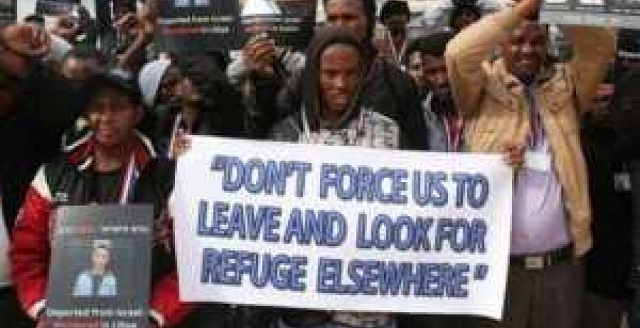Israel’s anti-African attitude baffling


A large section of the migrants, who mostly hail from Eritrea and Sudan say they escaped to Israel to seek asylum after fleeing persecution and conflict, but the authorities in Israel regard them as infiltrators
Saul Gwakuba Ndlovu
That historical background is not the aim of this article, however, here we are concerned with how the Jews, a people whose history is literally littered with several periods of persecution, discrimination, displacement, dispossession and dis-enfranchisement can refuse to accommodate people in similar circumstances just because they are of a different colour and religious cultural persuasion
The Israeli administration is reported to have given thousands of African refuge-seekers up to April 1 to leave the country or face detention. It describes them as “infiltrators,” on the ground that they illegally entered Israel.
Explaining the reason for expelling the Africans most of whom are from Eritrea and the Sudan, the Israel prime minister, Benjamin Netanyahu, said their presence in Israel was a threat to what he terms “the social fabric of the Jewish state.”
Simply stated, that means Netanyahu regards Israel as a mono-ethnic state, the Jews being the only racial group legally welcome into its borders. There are about 40 000 African refuge-seekers in Israel; some 20 000 are said to have been deported to either Rwanda or Uganda in the past few years.
Currently, the Israel government is offering $3 500 and an air ticket to each African refugee who agrees to leave Israel for whatever African country.
Israel was declared an independent state by the Jews in May 1948. Many of the Jews had gone to that land, formerly called Palestine, from various regions of the world such as estern Europe, central and Western Europe, south and north America, the United Kingdom, Australia, South Africa and some parts of Asia.
They had been born and bred abroad following their historic dispersion generally referred to as the Diaspora, a Greek word which means the dispersion of the Jews among the Gentiles about 800 to 600 years before the birth of Jesus Christ.
The process more or less continued in 70AD after Jerusalem was raided by the Romans. Those who went to eastern Europe were later referred to as the Ashkenazim and those in western Europe were described as the Sephardic Jews.
Those in central Europe were persecuted shortly before and during the Second World War, particularly by Adolf Hitler’s Nazi regime. They had, however, already begun campaigning for the establishment of a Jewish state, and closely consulted a number of prominent British colonialists including Cecil John Rhodes.
A wave of anti-Semitism swept the world except the United States at the height of the Diaspora. Austria-Hungary in central Europe passed a law prohibiting Jews from owning land in that empire.
It was in that period that Jews were confined to urban slums known as “ghettos” which originally meant the overcrowded, poorest parts of Austro-Hungarian towns to which Jews were confined. Hitler, an Austrian by birth, took the anti-Semitic campaign a tragic step higher by treating Jews as guinea-pigs to be experimented with in the Nazi concentration camps during the Second World War (1939-45).
By that time, the British government’s colonial office had already given the Jews permission “to establish a Jewish homeland in Palestine.” We should note that the wording “in Palestine” does not mean or imply that Jews were to turn the whole of Palestine into their homeland, but only a part of that land.
That historical background is not the aim of this article, however, here we are concerned with how the Jews, a people whose history is literally littered with several periods of persecution, discrimination, displacement, dispossession and disenfranchisement can refuse to accommodate people in similar circumstances just because they are of a different colour and religious cultural persuasion.
Their government’s anti-African measures create a most unfavourable impression about them, more so since they have already displaced several millions of Palestinians, a Semitic people whose ethnic origin is the same as that of the Jews.
It is not at all easy to admit that Israelis are of the same stock as Jesus Christ, founder of one of the world’s most respectable and most humane religions whose major pillars are love, peace, charity and the truth.
The 40 000 or so African refugees in Israel cannot pose a social or cultural threat to Israel’s seven or so million Jews any more than one or so million Jews were a social or cultural threat to 12 million Germans in Hitler’s Germany.
To the 55 African nations, the Israeli treatment of the 40 000 black refuge-seekers should be an indication of the continent’s collective social, economic and political shortcomings.
Eritrea has been unstable for more than 20 years, but there is no indication that the African Union is trying to resolve the matter.
The Sudan problem is being discussed although its causes are yet to be clearly defined. However, external factors cannot be ruled out for obvious historical, racial and religious reasons. The African Union should not try to reconcile the irreconcilable. Separation may be a better solution in some cases.
Meanwhile, while Israel is expelling African refuge-seekers from its territory, more Africans are desperately trying to cross the Mediterranean Sea to get to Europe. A large number has drowned in that sea, and many are drowning as we are reading this opinion article.
Causes of large numbers of Africans leaving Africa for Israel, Europe, north America and Australia are not unknown to the African Union. We all know how poorly administered some African states are. Eritrea is one of them.
Is the AU failing to put its house in order? Gone are the days when we used to blame colonialism for our own failures, our own weaknesses. Africa must face facts and act accordingly.
Very good examples of how Africans brew their own problems occurred in Burundi and in the DRC recently when their respective national presidents adamantly refused to step down at the end of their constitutional terms.
The AU should have disowned them not only at Addis Ababa, but very much so at the United Nations in New York. But did it? No! Instability was created by those two unconstitutional actions in Bujumbura and Kinshasa.
All the AU had to tell the two rebellious men is that they had acted unconstitutionally, and they would, ipso facto, not be recognised as heads of state because there is no difference between a rebel who overthrows a constitutional government by means of armed force, and one who does the same by over-riding the national constitution.
-Saul Gwakuba Ndlovu is a retired, Bulawayo – based journalist. He can be contacted on cell 0734 328 136 or through email. [email protected]









Comments